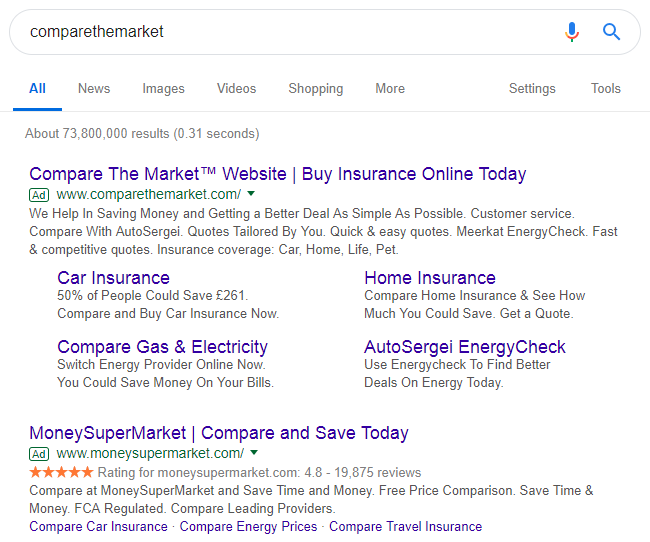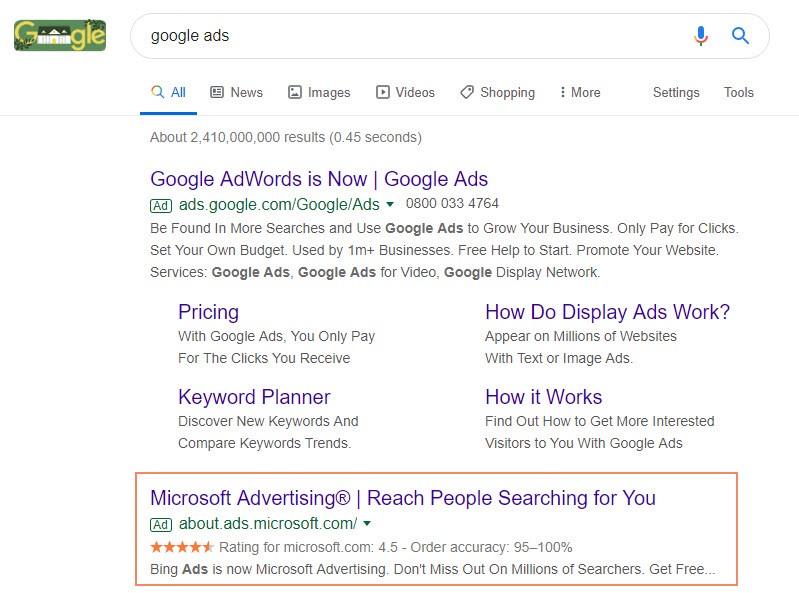If you are a part of the PPC advertising world, you will have come across the age-old question: should you bid on competitors’ brand names in Google Ads?
Google lifted the ban on bidding on competitors’ brands in 2008, and, while it is PPC best practice to bid on your own brand name to make sure you dominate the SERP (Search Engine Results Page), it is still up for debate on whether or not you should bid on your competitors’ brand names.
The short answer to the question is: there is no short answer. There are pros and cons which should be weighed up before taking the plunge and implementing this into your PPC strategy.
Before delving into the advantages and disadvantages, it is worthwhile explaining what is meant by competitor bidding in Google and Bing Ads.
What is PPC Competitor Bidding?
Competitor bidding refers to bidding on another company’s branded terms as part of your keyword targeting strategy, when their products/services are similar to yours.
For example, as seen in the screenshot below, when Googling comparison site Compare the Market, the search result in the second position features competitor website Money Super Market, also a comparison website.

This means that Money Super Market are bidding on Compare the Market’s brand name.
Why, you ask? Here’s what you need to know.
The Pros
One obvious benefit to competitor bidding is that it’s an easy avenue to poach relevant traffic. If you bid on a competitors’ brand name whose products or services are similar to yours, like with the above example of Compare the Market and Money Super Market, you’re effectively exposing your own brand to a relevant audience of users searching for products/services which you too offer.
Depending on the nature of your business and overall campaign objective, this can result in valuable website traffic, leads or sales.
While there is a clear, direct benefit of bidding on your competitor’s brand in terms of boosting traffic/conversions, there is also value in this in terms of increasing awareness amongst your target audience as a viable alternative. Perhaps your brand is lesser-known than your competitor’s, therefore, by bidding on their name, you are exposing your own brand to a relevant audience. This could work in your favour, as it keeps you front of mind for the consumers who are in the market for your own products/services and could therefore lead to a boost in conversions.
However, it’s not all fun and games in the world of competitor bidding, and there are some significant implications to this strategy to consider.
The Cons
The biggest downside to competitor bidding is that it starts a bidding war. Picture this: you Google your own brand name, and in the second position, you see a direct competitor. You have no control over what other competitors bid for, so, what can you do? Bid on their name as well. That’s exactly the risk you take with competitor bidding – they could start bidding on your brand name too, potentially poaching valuable customers from you. Not only that, but a bidding war can ramp up your CPCs (cost per click) too, since you now have competition for your own brand name.
To check whether other brands are bidding on your brand name, you can use Google’s Auction Insights Tool, where you can see which other advertisers have ads that appear alongside yours.
Another downfall to competitor bidding is that your click-through rate (CTR) is likely to be poor. Users who are searching for a specific brand have high intent and interest in their products/services, therefore they are less likely to be swayed by other brands, resulting in a poor CTR. A poor CTR also has a negative effect on your Google Ads account overall, so it’s something to bear in mind when considering competitor bidding.
Google’s Quality Score takes into account your ad relevance, max CPC bid and landing page experience. By bidding on competitors’ brand names, you hinder your Quality Score since landing page experience and ad relevance are poorer, by default, since your brand is different from your competitor’s. A lower Quality Score will, in turn, have a detrimental effect on your overall account Quality Score, hindering the performance of any other keywords you are targeting in your Google Ads account.
Assuming your competitors are bidding on their own name, they will have a high Quality Score for this, as their ads and landing page are more relevant. The implication of this is that they will have low CPCs for their own branded terms since Google’s auction process prefers and rewards high Quality Scores. Therefore, you will be paying more for their branded terms, given the lower Quality Score. This means that competitor bidding can be an expensive strategy to implement.
The Verdict on PPC Competitor Bidding
Ultimately, while competitor bidding may expose you to a relevant audience who is in the market for your products/services, the potential of entering a bidding war with your competitor, as well as damaging your overall account Quality Score, makes this a risky strategy.
So, as a parting note, it is entirely up to the advertiser to weigh up whether the risks are worth the reward. At the end of the day, Bing Ads seem to think it’s a good idea…

Get in touch
If you want to discuss the best Google Ads approach for your brand, click here to arrange a chat with one of our experts.
Back to blog